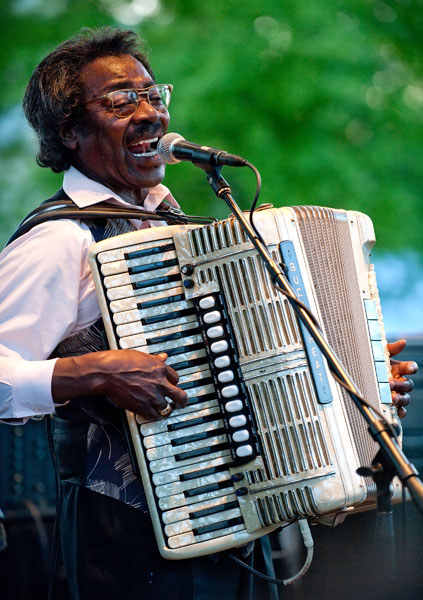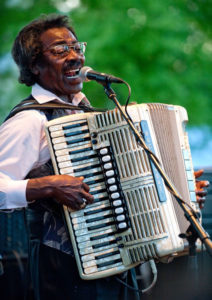Buckwheat Zydeco
Accordionist Stanley Dural, Jr., was zydeco's most commercially successful performer and an unofficial ambassador of the musical genre and Creole culture. Better known as "Buckwheat Zydeco," Dural helped introduce traditional Creole music to the mainstream.

Courtesy of Cajun and Zydeco Photos, David Simpson
Buckwheat Zydeco. Simpson, David (Photographer)
Accordionist Stanley Dural, Jr., was zydeco’s most commercially successful performer and an unofficial ambassador of the musical genre and Creole culture. Better known as “Buckwheat Zydeco,” Dural helped introduce traditional Creole music to the mainstream, as well as educate listeners about its origins in black Creole culture. Having recorded more than a dozen albums, Dural was nominated for four Grammy awards. He also performed at the closing ceremonies of the 1996 Olympics and at both of President Clinton’s inaugurations.
Early Life and Career
Stanley Joseph Dural, Jr., was born on November 14, 1947, in the Truman Addition neighborhood of Lafayette, the fourth of thirteen children. As a boy, Dural lived a typical rural Louisiana lifestyle: hunting, fishing, and picking cotton. His childhood nickname was derived from his braided hair, which caused him to resemble the Buckwheat character from the Little Rascals short film series, later aired on television. Something of a child prodigy, Dural was playing piano at the age of five, later switching to organ. His earliest musical influences included his mother, who sang spirituals around the family home, and his father, a close friend of zydeco legend Clifton Chenier. Stanley Dural, Sr. played keyboard accordion, but his son viewed zydeco as old-fashioned music and preferred the more modern sound of rhythm and blues (R&B).
Dural would sneak into local clubs to hear R&B legends like Fats Domino, sometimes even sitting in with the band. By the mid-1950s, at the age of nine, he was playing professionally with drummer Lynn August. He continued to play R&B for the next two decades with Sammy & the Untouchables (opening for Fats Domino, Little Richard, and Ray Charles) and Little Buck & the Top Cats, often backing touring R&B singers such as Joe Tex, Clarence “Gatemouth” Brown, Barbara Lynn, Bobby “Blue” Bland, and Solomon Burke. From 1971 until about 1975, Dural led a fifteen-piece soul revue, Buckwheat and the Hitchhikers, playing funk and soul hits by such artists as the Ohio Players, Parliament/Funkadelic, and James Brown.
Career in Zydeco
Dural broke up the Hitchhikers in 1975, finding it too difficult to keep the large band together. He had intended to take some time off, but his old friend and bandmate Paul “Little Buck” Senegal, who was now playing with Clifton Chenier, urged him to try playing zydeco. Somewhat reluctantly, Dural brought his Hammond B-3 organ to a Chenier show in Lafayette, where he had his “zydeco epiphany.” He was amazed by the power of the music, the excitement it generated in the audience, and the band’s stamina. They played for four hours without stopping, and when it was over Dural was ready to keep playing. Thoroughly convinced, Dural joined Chenier’s band and stayed for two and a half years. The band’s shows began to attract younger audiences, who knew Dural from Buckwheat and the Hitchhikers.
After leaving Chenier’s band, Dural decided that he would learn to play accordion. After eight months of practice, he felt that he was ready and formed the Ils Sont Partis Band, named after the exclamation (“They’re off!”) heard at the beginning of horse races at the Evangeline Downs Racetrack near Lafayette. The band’s first five albums were released on the small independent labels Blues Unlimited and Black Top. They moved to the higher profile Rounder Records for their next two releases, Turning Point (1984) and Waitin’ for My Ya Ya (1985), both nominated for Grammys. The title cut of the Turning Point album, originally a soul hit for Tyrone Davis, is an excellent example of the band’s fusion of Southern soul and zydeco.
In 1986, Dural began a partnership with New York-based music writer and zydeco fan Ted Fox, who became his manager and producer. Dural and Fox both wanted to market Buckwheat Zydeco’s music to a younger rock audience. Already an R&B enthusiast, Dural modernized his sound, covering popular rock and soul songs and adding keyboards and horns to the traditional zydeco instrumentation. Some zydeco purists complained about Dural’s “crossover” aspirations, but most listeners enjoyed the band’s updated approach.
After interviewing Island Records label head Chris Blackwell for an upcoming book, Fox suggested that Island record Buckwheat Zydeco, later sending Blackwell a tape made from the band’s early albums. Blackwell offered the band a five-album contract, and Buckwheat Zydeco became the first zydeco band signed to a major label. The resulting album, On a Night Like This (1987), was nominated for a Grammy, appeared on the Billboard magazine pop charts for several weeks, and was named one of the year’s top ten records by the New York Times.
The band had good timing, benefiting from the mid-1980s fascination with Louisiana and New Orleans culture, epitomized by the popularity of Cajun cuisine and of the film The Big Easy. Several more albums for Island followed, but the label was eventually sold to Polygram. Blackwell departed the company and the band was left in search of a new label. In the late 1990s, after a number of other major-label shakeups hurt the promotion of the band’s records, Dural and Fox decided to form their own label, Tomorrow Recordings, named after Dural’s daughter.
Buckwheat Zydeco and his band have continued to release albums throughout the 1990s and 2000s. The Buckwheat Zydeco Story: A 20-Year Party, was released in 1999 and includes songs from all phases of the band’s career. Their album Lay Your Burden Down (2009) featured an eclectic list of guest musicians including Sonny Landreth, Steve Berlin, Trombone Shorty, and Warren Haynes, and an equally varied repertoire including covers of songs by Bruce Springsteen, Jimmy Cliff, Captain Beefheart, Memphis Minnie, and Government Mule.
Commercial Success
By the late 1980s, Buckwheat Zydeco’s music could be heard on late-night talk shows, network television programs, movie soundtracks, and commercials. The band had opened for Eric Clapton, U2, Robert Cray, and Los Lobos, and toured and/or recorded with Keith Richards, Robert Plant, Willie Nelson, Mavis Staples, Dwight Yoakam, Paul Simon, Ry Cooder, and many others. They continued to play concerts and music festivals worldwide and to a television audience estimated at three billion during the closing ceremonies of the 1996 Summer Olympics in Atlanta, Georgia. Dural even won an Emmy for his music in the CBS TV-movie Pistol Pete: The Life and Times of Pete Maravich.
Taking up zydeco was a conscious choice for Dural, who wanted to explore his musical roots while modernizing the zydeco sound. He was the logical successor to Clifton Chenier and more than any other zydeco performer, had exposed the music to new audiences. He was careful to emphasize the distinction between black Creole (zydeco) and white Cajun music, which is sometimes conflated by unfamiliar listeners. He also points out that zydeco is from southern Louisiana rather than New Orleans.
Dural was a tireless promoter of Creole culture and zydeco music who, while not touring, always made time to play a “homecoming” show at El Sid O’s in Lafayette, a club he christened with his opening-night performance in 1985. In the late summer and early fall of 2009, the band embarked on a nationwide thirtieth anniversary tour. Dural continued playing R&B, as well, as evidenced by his regular appearances with Little Buck & the Top Cats at the Ponderosa Stomp, an annual festival held in New Orleans.
Dural died at the age of 68 on September 24, 2016.
